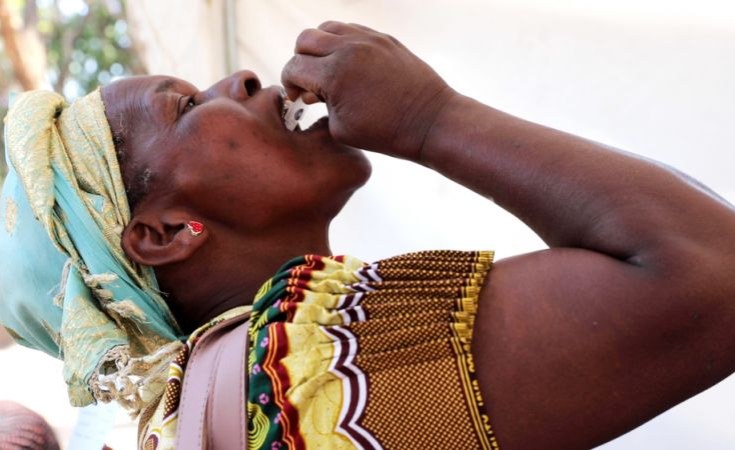An aircraft chartered by UNICEF carrying 1.4 million doses of oral cholera vaccines landed in Port Sudan on Saturday, to bolster efforts to protect children from the ongoing cholera outbreak affecting the country. The new batch of vaccines adds to the 404,000 doses UNICEF delivered to Sudan last month and will be used in the ongoing immunisation campaigns. The campaigns aim to vaccinate 1.81 million people against cholera in the hardest-hit states: El Gedaref, Kassala and River Nile.
Since the current outbreak began in July, over 18,000 cases of cholera and approximately 550 deaths have been reported in 10 states across the country.
Besides cholera, concurrent outbreaks of other diseases - such as dengue, malaria and measles - are taking hold in at least 12 of Sudan's 18 states. Earlier this week, UNICEF delivered nearly 190,000 doses of malaria vaccines to the country to help protect children from malaria.
"Coming on the heels of war, displacement and famine, the impact of these epidemics could be catastrophic for children," said Sheldon Yett, UNICEF Representative to Sudan. "Delivery of the vaccines to health authorities in Sudan and into the arms of communities most at risk is essential for stopping the spread of these deadly diseases."
Ongoing disease outbreaks are pushing Sudan's already fragile healthcare system to a breaking point and exacerbating weaknesses in the sanitation and hygiene infrastructure. Limited access to safe water and adequate sanitation, especially in overcrowded displacement sites and camps increases the risk of transmission. Children who have never been vaccinated and those suffering from malnutrition are particularly at risk.
"We need all hands on deck now to scale up our response, halt the cholera outbreak and other diseases, and protect the most vulnerable children," said Yett.
To step up its efforts to prevent famine and disease outbreaks in the next six months, UNICEF is appealing $40 million to provide assistance in the affected areas.
Epidemic
The official cholera epidemiological situation report, issued by Sudan's Department of Surveillance and Information of the Sudanese Ministry of Health in Port Sudan reports 562 new infections on Thursday and Friday, including 11 deaths, which brings the cumulative number of cholera cases in 12 of the 18 states of the country to 20,398, of whom 597 have died.
The health promotion group referred to a combating cholera campaign in several states, which includes home visits, community dialogues, and messages in various media outlets and social media.
The dengue fever epidemiological report announced 177 cases on Thursday and Friday in Kassala and Khartoum, without any deaths, bringing the cumulative number of cases in four states to 910, including three deaths.
* Sudan is grappling with multiple disease outbreaks including cholera, malaria, dengue fever, measles, and rubella. An estimated 3.4 million children under five are at high risk of epidemic diseases.
An estimated 3.1 million people, including 500,000 children under the age of five, are at risk of cholera between July and December 2024.
National vaccination coverage in Sudan has plummeted from 85 per cent before the war to approximately 50 per cent. In active conflict zones the rates are averaging at 30 per cent. According to estimates, more than 700,000 children in Sudan have not received vaccinations of any kind. The delivery of vaccine supplies and routine immunisation activities have been hindered by security concerns and lack of access.
More than 70 per cent of hospitals in conflict-affected areas are non-operational and frontline workers including nurses and doctors have not been paid in months.
UNICEF is implementing a multisectoral cholera response in partnership with the Federal Ministry of Health and WHO to control the outbreak in the affected states and to curb the spread of the disease.
In addition to procuring and shipping vaccines in partnership with Gavi, the vaccine alliance, UNICEF will provide four refrigerator trucks to bolster the cold chain and ensure vaccines are safely transported to health centres. UNICEF has similarly mobilised water, hygiene, sanitation and health supplies, services, and expertise. UNICEF engages communities through media and dialogues, door-to-door visits, and key messaging on the causes, symptoms, and prevention of cholera. (Source: UNICEF)
** Cholera is an acute diarrhoeal infection caused by eating or drinking food or water that is contaminated with the bacterium Vibrio cholerae. Cholera remains a global threat to public health and is an indicator of inequity and lack of social development. Researchers have estimated that every year, there are 1.3 to 4.0 million cases of cholera, and 21 000 to 143 000 deaths worldwide due to the infection.
The extremely serious disease can cause severe acute watery diarrhoea with severe dehydration. It takes between 12 hours and five days for a person to show symptoms after consuming contaminated food or water. Cholera affects both children and adults and can kill within hours if untreated.
Most people infected with Vibrio cholerae do not develop any symptoms, although the bacteria are present in their faeces for 1-10 days after infection. This means the bacteria are shed back into the environment, potentially infecting other people.
(Source: WHO)


